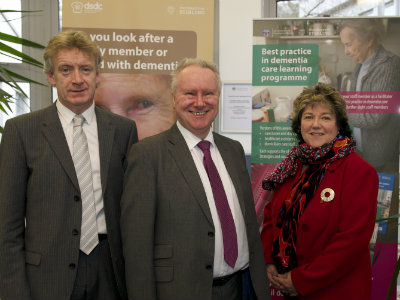
Alex Neil, Cabinet Secretary for Health and Well-being, praised the University of Stirling’s contribution to improvements in dementia care in Scotland during a visit to the Dementia Services Development Centre (DSDC) at the University on Wednesday 18 December.
Mr Neil toured the Design and Technology suite and facilities at the DSDC’s Iris Murdoch Building, accompanied by Professor June Andrews, Director of the DSDC, University Principal and Vice Chancellor Professor Gerry McCormac, and Kevin McGeever, member of the Dementia Services Development Trust Board.
Mr Neil said: “The Scottish Government values and supports the DSDC’s work to improve dementia services in Scotland. I was delighted to see for myself their suite of facilities and resources. As part of Scotland’s second National Dementia Strategy, the Scottish Government continues to focus on key areas such as diagnosis, post-diagnostic support and improving hospital care.”
Mr Neil was also shown a short presentation highlighting the achievements of the University in improving Dementia care services through research, teaching, consultancy and change management. He also took time to chat to staff at the DSDC about research in dementia care and international exports of dementia knowledge and services from Stirling to the rest of the world.
Professor June Andrews, Director of the DSDC, said: “It was a great pleasure to welcome Mr Neil and to show some of the work that we are doing here at the University of Stirling and all over the world. Recently we’ve had great success in winning an international research grant to look at dementia-friendly communities. This demonstrates the broad range of our activity, from high level research to working directly and locally with families and people with dementia to help to make their lives better.”
